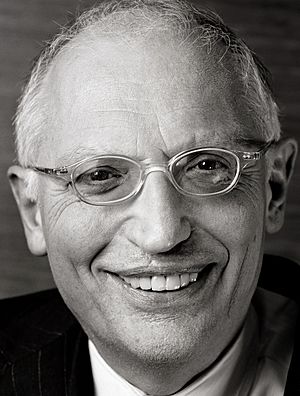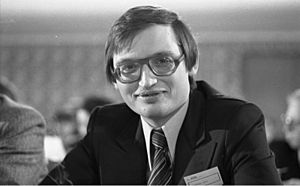Günter Verheugen facts for kids
Quick facts for kids
Günter Verheugen
|
|
|---|---|

Verheugen in 2007
|
|
| European Commissioner for Enterprise and Industry | |
| In office 22 November 2004 – 9 February 2010 |
|
| President | José Manuel Barroso |
| Preceded by | Ján Figeľ Olli Rehn (Enterprise and Information Society) |
| Succeeded by | Antonio Tajani (Industry and Entrepreneurship) |
| European Commissioner for Enlargement | |
| In office 13 September 1999 – 11 November 2004 Serving with Janez Potočnik
|
|
| President | Romano Prodi |
| Preceded by | Position established |
| Succeeded by | Olli Rehn |
| Member of the Bundestag | |
| In office 1983–1999 |
|
| Personal details | |
| Born | 28 April 1944 Bad Kreuznach, Germany |
| Political party | Social Democratic Party (1982–present) |
| Other political affiliations |
Free Democratic Party (Before 1982) |
| Alma mater | University of Cologne University of Bonn |
Günter Verheugen (born 28 April 1944) is a German politician. He was a very important person in the European Union (EU). From 1999 to 2004, he was the European Commissioner for Enlargement. This meant he helped new countries join the EU. After that, from 2004 to 2010, he was the European Commissioner for Enterprise and Industry. In this role, he worked on helping businesses and industries in Europe. He was also one of the five vice presidents of the Barroso Commission. Today, he is an honorary professor at the European University Viadrina.
Contents
Early Life and School
Günter Verheugen was born in Bad Kreuznach, Germany. He studied history, sociology, and political science. He went to the University of Cologne and the University of Bonn.
Günter Verheugen's Political Journey
Verheugen started his political career as the Secretary General of the Free Democratic Party of Germany (FDP). He held this position from 1978 to 1982. In 1982, he left the FDP and joined the Social Democratic Party of Germany (SPD). Many other members who believed in similar ideas also left the FDP at that time.
Serving in the German Parliament
In 1983, Günter Verheugen became a member of the Bundestag, which is the German Parliament. He was part of the Committee on Foreign Affairs for many years, from 1983 to 1998. During the 1980s, he spoke out against unfair practices in South Africa. He even wrote a book in 1986 that showed how some big German companies tried to get around international rules.
From 1994 to 1997, Verheugen was a deputy leader of the SPD group in Parliament. He also led the Broadcasting Council of Deutsche Welle, a German news organization, from 1994 to 1998. Before the 1998 elections, he was an important advisor for Gerhard Schröder's campaign. He helped with foreign affairs and traveled with Schröder.
Working for Europe
From 1998 to 1999, Verheugen briefly served as a Minister of State in the German Foreign Office. During this time, Germany was leading the Council of the European Union. He helped negotiate important EU policy changes called Agenda 2000. In 1999, he left the German Parliament to become an EU Commissioner.
A Leader in the European Commission
The German government chose Günter Verheugen to be a European Commissioner. His first role was European Commissioner for Enlargement in the Prodi Commission. He played a key part in helping ten new countries join the EU in 2004.
After that, he continued in the next Barroso Commission. He became the Commissioner for Enterprise and Industry. He was also promoted to one of the five vice presidents.
In 2003, Verheugen and French Commissioner Pascal Lamy suggested a plan. This plan proposed that France and Germany work even more closely together in some areas. This included ideas like having combined armed forces and shared embassies.
As a Commissioner, Verheugen wanted to reduce complicated rules, especially for small and medium-sized businesses. He also believed that research and new ideas were very important for Europe's future success. His main goals were better rules, a modern approach to industry, supporting small businesses, and encouraging new ideas. He worked on the REACH regulation, which is about chemicals, and wanted a common patent system in the EU by 2012.
Verheugen also suggested that the EU might consider taxes on products from countries that were not doing enough to reduce carbon emissions.
Later Years
After leaving his public roles, Günter Verheugen has taken on various positions. He has been an advisor for different organizations and companies. For example, he joined the International Advisory Board of FleishmanHillard and became a senior advisor for the Royal Bank of Scotland (RBS) in 2010.
In 2014, he became a visiting professor at the University of Duisburg-Essen in Germany. He taught and gave lectures there. From 2015, Verheugen also led a project to help Ukraine become more integrated with the EU. This project aimed to modernize Ukraine and find investments for its development.
Views and Opinions
Günter Verheugen has shared his thoughts on various topics.
On Making EU Rules Simpler
- "Many people still think that the more rules Europe makes, the more 'Europe' we have." (October 2006)
- "My goal is to change the idea that the Commission's job is just to keep making laws." (October 2006)
- "We need to ask if so many decisions really need to be made in Brussels." (June 2016)
Honours and Awards
Günter Verheugen has received several awards and honours for his work.
From Germany
- He was awarded the Knight Commander of the Order of Merit of the Federal Republic of Germany.
From Other Countries
- He is an honorary citizen of Šibenik, Croatia.
- He received the 1st Class of the Order of the Cross of Terra Mariana from Estonia.
- He received the 1st Class of the Order of the Three Stars from Latvia.
- He received the Grand Cross (or 1st Class) of the Order of the White Double Cross from Slovakia in 2004.
- He received the 1st Class of the Order of the White Lion from the Czech Republic in 2016.
See also
 In Spanish: Günter Verheugen para niños
In Spanish: Günter Verheugen para niños
 | Mary Eliza Mahoney |
 | Susie King Taylor |
 | Ida Gray |
 | Eliza Ann Grier |


